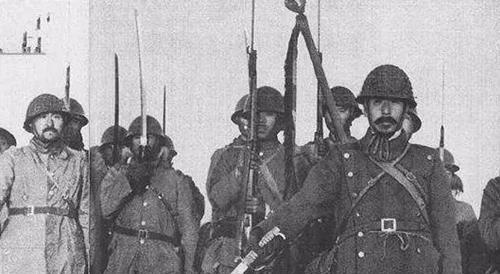When it comes to war, the devastating power it has brought to mankind is immeasurable. At present, the struggle between countries is still continuing, but it is mainly about economic strength, and military strength is more of a deterrent. In history, there have been many wars, but three of them are called the most difficult countries to fight, one in each uniform in China and the United States, and one that no one has dared to challenge so far.

The first is Japan, and when it comes to Japan, we have to mention the war of aggression waged against our country in the last century. Since the "Meiji Restoration", The Meiji Emperor began to learn from the West in an attempt to surpass the "First Fleet of Asia" Beiyang Naval Division built by Li Hongzhang at that time, in order to develop into a modern navy, the Meiji Emperor also paid 300,000 yuan out of his own pocket, and even the empress sold the jewelry and pooled the money to buy warships.
Under the encouragement of Prime Minister Itō Hirobumi, the people were all moved, and within half a year, the donation reached 2.03 million yen, and even officials had to allocate one-tenth of the money to the national treasury to buy warships, and in this way, with the unremitting support of Emperor Meiji, Japan has built a modern Japanese navy with 31 warships, 24 torpedo boats, and a total displacement of 61,373 tons.
On the other hand, Cixi, in order to celebrate the 60th birthday, stopped all the annual funds of the Beiyang Marine Division of 4 million taels, and did not purchase a new warship for three years. It was not until the defeat at the Battle of Jiawu that the Qing court realized that it was full of dangers, until the 30s and 40s of the last century, when the Japanese began to launch a full-scale war of aggression in order to plunder resources.
After 14 years of arduous resistance, the Japanese invaders were successfully driven out. But our country has also paid 35 million bloody sacrifices for this. In order to end Japan's war in Southeast Asia and the mainland, the United States finally chose to use atomic bombs to drop an atomic bomb over Hiroshima and Nagasaki in Japan, and Emperor Hirohito accepted unconditional surrender, and the Japanese fully realized the cruelty of the war.
The second is Vietnam, in order to intervene in Vietnam, the United States sent 500,000 troops, plus a coalition of South Korea, Australia and other countries, a total of nearly one million troops in Vietnam for 12 years of tug-of-war. The Vietnam War was the longest-running war in U.S. history, costing at least $250 billion.
Although the United States has not lost militarily, it also shows a major mistake in the United States' Cold War strategy, turning the United States from a strong side into a weak side. In 1978, Vietnam sent troops to Cambodia, destroying the situation in ASEAN countries, harassing China's borders, and deliberately provoking conflicts.
On February 17, 1979, the counterattack against Vietnam began, and after a month of fighting, our army ended the war in victory. It dealt a heavy blow to the inflated confidence of Vietnam after the victory after the Vietnam War and maintained the stability of the southwest frontier. In the decades that followed, Vietnam never dared to cross the thunder pond half a step.
The last one is Switzerland, a country that was not occupied in World War I and World War II, and during the Cold War, Switzerland also maintained a neutral attitude and was respected by both camps. In fact, as early as 1815, Switzerland signed the Paris Treaty, and the participating countries also agreed to make Switzerland a permanent neutral country.
Although Switzerland has a small land area and only 3600 professional soldiers, Switzerland pays attention to army building, and the equipment of the troops is basically fully modernized, plus it is a permanent neutral country in the world, so no country has ever dared to challenge. What do you think about that?